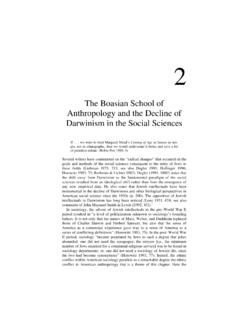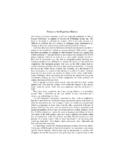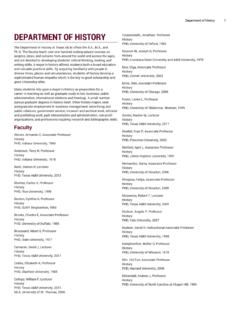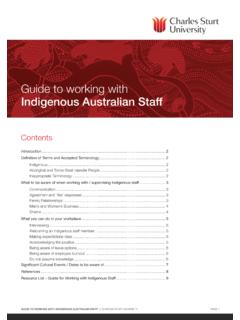Transcription of American Transcendentalism - Kevin B. MacDonald
1 American Transcendentalism : AN indigenous CULTURE OF CRITIQUE American Transcendentalism A history Philip F. Gura New York: Hill and Wang, 2007 Reviewed by Kevin MacDonald The Occidental Quarterly 8(2), 91-106, Summer, 2008. Philip Gura s American Transcendentalism provides a valuable in-sight into a nineteenth-century leftist intellectual elite in the United States. This is of considerable interest because Transcendentalism was a movement entirely untouched by the predominantly Jewish milieu of the twentieth-century left in America.
2 Rather, it was homegrown, and its story tells us much about the sensibility of an important group of white intellectuals and perhaps gives us hints about why in the twentieth century WASPs so easily capitulated to the Jewish on-slaught on the intellectual establishment. Based in New England, Transcendentalism was closely associated with Harvard and Boston the very heart of Puritan New England. It was also closely associated with Unitarianism which had become the most common religious affiliation for Boston s elite.
3 Many Transcen-dentalists were Unitarian clergymen, including Ralph Waldo Emerson, the person whose name is most closely associated with the movement in the public mind. These were very intelligent people living in an age when religious beliefs required an intellectual defense rather than blind obedience. Their backgrounds were typical of New England Christians of the day. But as their intellectual world expanded (often at the Harvard Divinity School), they became aware of the higher criticism of the Bible that originated with German scholars.
4 This scholarship showed that there were several different authors of Genesis and that Moses did not write the first five books of the Old Testament. They also became aware of other religions, such as Buddhism and Hinduism which made it unlike-The Occidental Quarterly, vol. 8, no. 2, Summer 2008 92ly that Christianity had a monopoly on religious truth. In their search for an intellectual grounding of religion, they re-jected Locke s barren empiricism and turned instead to the idealism of Kant, Schelling, and Coleridge.
5 If the higher criticism implied that the foundations of religious belief were shaky, and if God was unlikely to have endowed Christianity with unique religious truths, the Tran-scendentalists would build new foundations emphasizing the subjec-tivity of religious experience. The attraction of idealism to the Tran-scendentalists was its conception of the mind as creative, intuitive, and interpretive rather than merely reactive to external events. As the writer and political activist Orestes Brownson summed it up in 1840, Transcendentalism defended man s capacity of knowing truth intui-tively [and] attaining scientific knowledge of an order of existence transcending the reach of the senses, and of which we can have no sensible experience (p.)
6 121). Everyone, from birth, possesses a divine element, and the mind has innate principles, including the religious sentiment (p. 84). The intuitions of the Transcendentalists were decidedly egalitarian and universalist. Universal divine inspiration grace as the birthright of all was the bedrock of the Transcendentalist movement (p. 18). Ideas of God, morality, and immortality are part of human nature and do not have to be learned. As Gura notes, this is the spiritual equivalent of the democratic ideal that all men (and women) are created equal.
7 Intuitions are by their very nature slippery things. One could just as plausibly (or perhaps more plausibly) propose that humans have in-tuitions of greed, lust, power, and ethnocentrism precisely the view of the Darwinians who came along later in the century. In the context of the philosophical milieu of Transcendentalism , their intuitions were not intended to be open to empirical investigation. Their truth was obvious and compelling a fact that tells us much about the religious milieu of the movement. On the other hand, the Transcendentalists rejected materialism with its emphasis on facts, history , the force of circumstance and the animal wants of man (quoting Emerson, p.)
8 15). Fundamentally, they did not want to explain human history or society, and they certainly would have been unimpressed by a Darwinian view of human nature that emphasizes such nasty realities as competition for power and resources and how these play out given the exigencies of history . Rather, they adopted a utopian vision of humans as able to transcend all that by MacDonald , Transcendentalism 93means of the God-given spiritual powers of the human mind. Not surprisingly, this philosophy led many Transcendentalists to become deeply involved in social activism on behalf of the lower eche-lons of society the poor, prisoners, the insane, the developmentally disabled, and slaves in the South.
9 * * * The following examples give a flavor of some of the central atti-tudes and typical social activism of important Transcendentalists. Orestes Brownson (1803 1876) admired the Universalists belief in the inherent dignity of all people and the promise of eventual univer-sal salvation for all believers. He argued for the unity of races and the inherent dignity of each person, and he lambasted Southerners for trying to enlarge their political base (p. 266). Like many New En-glanders, he was outraged by the Supreme Court decision in the Dred Scott case that required authorities in the North to return fugitive slaves to their owners in the South.
10 For Brownson the Civil War was a moral crusade waged not only to preserve the union, but to emanci-pate the slaves. Writing in 1840, Brownson claimed that we should realize in our social arrangements and in the actual conditions of all men that equality of man and man that God had established but which had been destroyed by capitalism (pp. 138 39). According to Brownson, Christians had to bring down the high, and bring up the low; to break the fet-ters of the bound and set the captive free; to destroy all oppres-sion, establish the reign of justice, which is the reign of equality, between man and man; to introduce new heavens and a new earth, wherein dwelleth righteousness, wherein all shall be as brothers, loving one another, and no one possessing what anoth-er lacketh.











